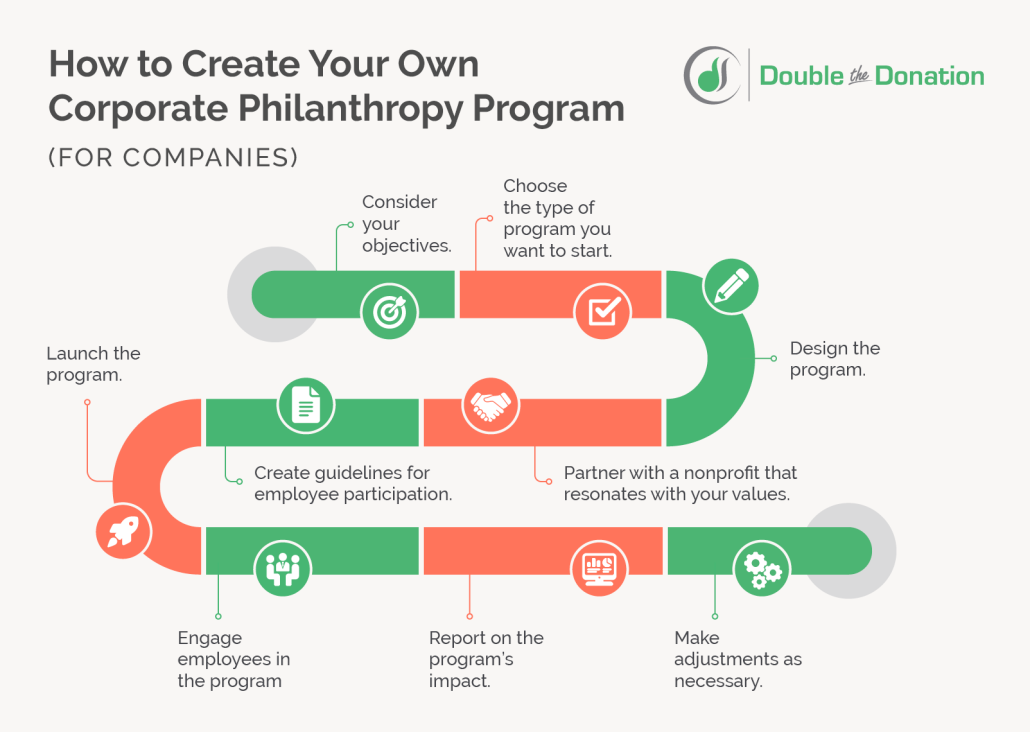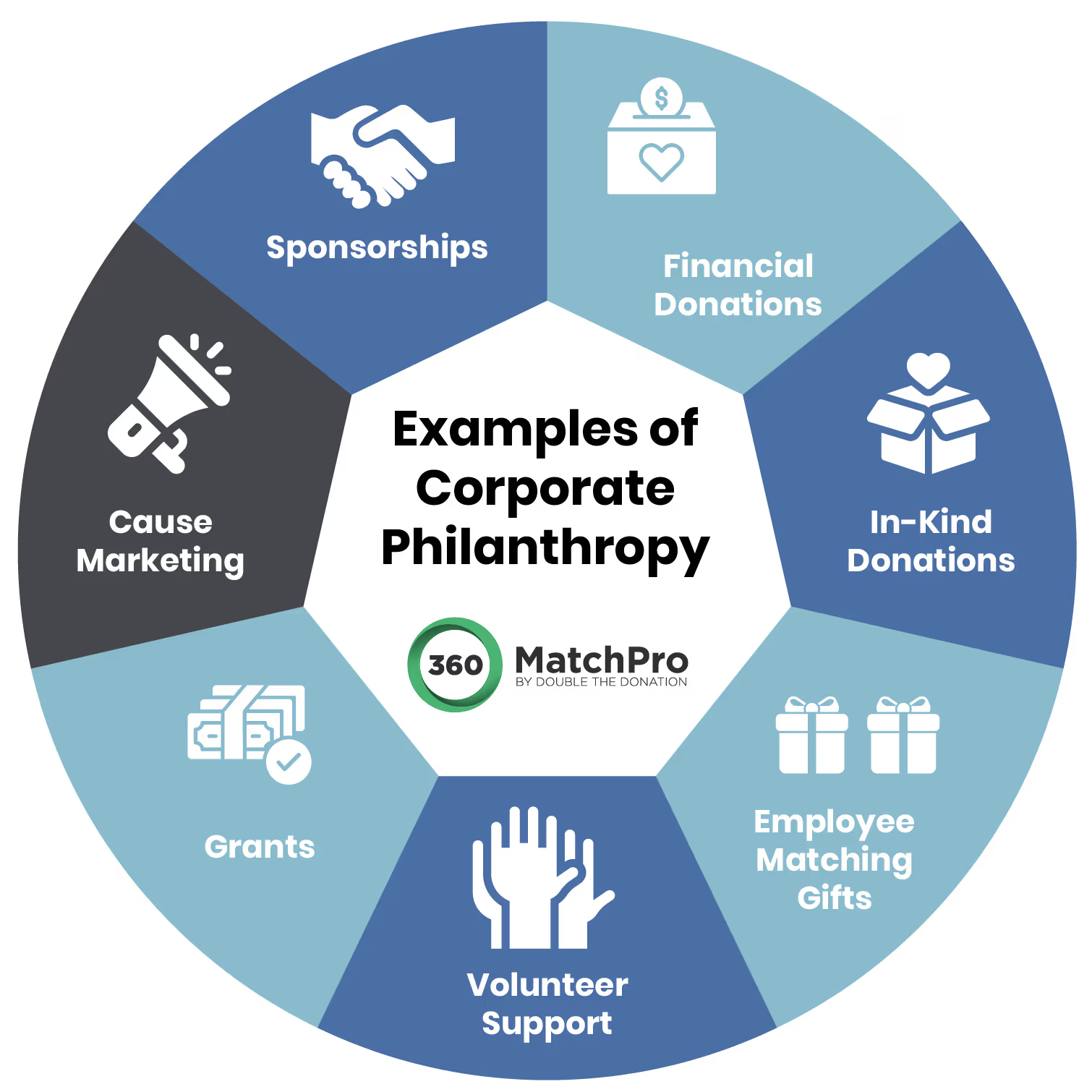Discovering the Influence of Corporate Philanthropy on Area Development and Staff Member Involvement
Business philanthropy works as a vital mechanism for fostering community advancement and enhancing worker involvement. By tactically allocating sources to regional campaigns, firms can address critical problems such as education and learning and medical care. This strategy not only reinforces community ties however likewise straightens with staff member values, promoting greater work environment spirits. However, the complexities of stabilizing corporate passions with authentic neighborhood impact raise concerns worth discovering even more. What approaches generate the most substantial benefits for both organizations and neighborhoods?
The Function of Corporate Philanthropy in Community Development
While lots of aspects contribute to area development, company philanthropy plays a critical function in promoting social progression and economic growth. By allocating sources to local initiatives, business can deal with pressing neighborhood demands, such as education and learning, medical care, and environmental sustainability. This financial backing not only aids in the development of necessary services but additionally cultivates and encourages regional organizations cooperation amongst stakeholders.Moreover, corporate philanthropy boosts the overall track record of organizations, making them more appealing to consumers and possible workers. As firms involve with neighborhoods, they grow trust and enhance partnerships, which can result in raised consumer loyalty and staff member contentment. In addition, participation in neighborhood tasks can drive development and creativity within the corporate structure, as employees are motivated to add to meaningful causes. Eventually, company philanthropy acts as a driver for favorable modification, producing a more resistant and vibrant neighborhood via tactical investments in its future.
Structure Stronger Communities Via Strategic Granting
Strategic offering can significantly enhance areas by straightening business philanthropy with lasting neighborhood objectives and needs. By evaluating the distinct difficulties and chances within an area, firms can direct their sources to efforts that cultivate lasting growth. This approach not only addresses prompt issues but likewise adds to the overall durability of the community.For circumstances, supporting regional education and learning programs can boost labor force skills, while funding ecological projects can improve public health and wellness and quality of life. Collaborations with neighborhood organizations typically magnify these initiatives, guaranteeing that donations are tailored to the neighborhood's certain context.Moreover, clear communication concerning humanitarian initiatives develops trust in between companies and community participants, encouraging continuous collaborations. Ultimately, with critical giving, business can develop a more substantial impact, promoting a sense of shared duty and collective development that profits both the corporate entity and the community at large.
Enhancing Staff Member Involvement Via Philanthropic Efforts
Company philanthropy can considerably enhance staff member involvement when campaigns are thoughtfully created to align with staff members' worths and interests. When organizations implement philanthropic programs that resonate with their workforce, workers commonly really feel a stronger connection to their employer. This feeling of function can result in improved morale and job satisfaction, as workers perceive their payments as meaningful.Additionally, opportunities for staff members to volunteer and get involved in humanitarian tasks foster synergy and cooperation, boosting social partnerships within the office. Such campaigns give a system for workers to share their enthusiasms and skills, promoting a sense of possession and satisfaction in the company's objective. Commemorating and acknowledging staff member involvement in humanitarian efforts can increase inspiration and commitment, creating a favorable feedback loophole. Eventually, lining up business philanthropy with worker values not only profits the neighborhood yet likewise cultivates an extra engaged and devoted workforce.
The Economic Conveniences of Corporate Giving
Business offering offers considerable financial benefits that prolong beyond simple selflessness. By sustaining neighborhood areas, companies can promote regional economic climates and enhance their brand name credibility. In addition, the financial ramifications of tax obligation incentives additionally underscore the functional benefits of engaging in philanthropic activities.
Boosting Neighborhood Economies
While many might overlook the value of business philanthropy, its influence on regional economies is profound. Firms that engage in philanthropic activities often add monetary sources to regional campaigns, developing tasks and stimulating economic growth. By sustaining local nonprofits, companies aid fund programs that resolve neighborhood needs, from education to medical care, promoting a more resistant setting. Furthermore, when companies donate to local projects, they frequently resource materials and services from neighboring vendors, better improving financial activity. The infusion of sources into neighborhood economic situations advertises a cycle of growth, motivating entrepreneurship and development. Eventually, corporate philanthropy not just boosts communities but also reinforces the financial fabric, profiting both the corporations involved and the regions they serve.
Enhancing Brand Name Reputation
Just how can a dedication to philanthropy improve a business's public photo? Business giving fosters positive understandings amongst consumers, enhancing brand online reputation markedly. Corporate Volunteer. By actively joining neighborhood campaigns, businesses show social responsibility and align with values that reverberate with their target audience. This positioning can result in boosted client commitment, as consumers commonly choose brand names that add to social well-being. In addition, a strong kind existence can separate a company from rivals, establishing it as a leader in business social obligation. As organizations buy regional neighborhoods, they cultivate depend on and a good reputation, which can equate right into greater sales and improved market setting. Inevitably, improving brand name track record with philanthropy not just advantages neighborhoods but also contributes to long-term financial sustainability for the firm
Tax Obligation Rewards and Benefits
Philanthropic initiatives not only improve a company's public image yet also offer substantial economic advantages through tax obligation motivations. Corporations commonly obtain deductions for charitable contributions, which can minimize taxable income and lower general tax obligation responsibilities. This monetary advantage urges services to participate in philanthropy, as payments to professional companies can yield a concrete return on financial investment. In addition, firms can reinforce their connections with regional neighborhoods, cultivating goodwill and potentially leading to boosted customer loyalty. In some areas, tax debts might additionally be readily available for efforts that support neighborhood advancement, additional incentivizing business more information providing. Therefore, businesses can efficiently align their social responsibility objectives with their economic goals, producing a win-win circumstance for both the company and the areas it offers.
Situation Studies: Successful Business Philanthropy Programs
Business philanthropy has ended up being a vital part of many companies' techniques, showcasing their commitment to social duty. Various companies have effectively executed humanitarian programs that substantially profit their neighborhoods and boost employee involvement. A major innovation company launched an effort supplying coding education and learning to underserved youth, resulting in improved community technology proficiency and a strengthened workforce pipe. Another instance is an international food firm that partnered with local farmers to promote lasting farming, promoting economic development in rural areas while making certain a stable supply of top quality ingredients. These study show the profound impact of business philanthropy, as organizations not just satisfy their honest obligations yet additionally grow a favorable business photo. Staff members usually reveal raised job contentment and commitment when participated in programs that contribute meaningfully to culture, showing the twin benefits of such efforts for both the neighborhood and the company.
Best Practices for Carrying Out Reliable Philanthropic Approaches
Reliable kind techniques require placement with a company's core worths, guaranteeing credibility in giving. Proactively engaging workers in these campaigns fosters a feeling of ownership and dedication. Furthermore, gauging social effect accurately is important for reviewing the efficiency and sustainability of kind initiatives.
Straightening With Business Worths

Involving Staff Members Actively
Energetic interaction of staff members in humanitarian initiatives promotes a feeling of ownership and purpose within the company. Companies can implement efficient strategies by encouraging volunteerism, allowing staff members to choose causes they are enthusiastic about, and supplying chances for team-based tasks. Routine communication about kind efforts enhances their relevance and promotes a culture of giving. Leadership should model kind actions, demonstrating commitment to neighborhood involvement. Additionally, acknowledging and commemorating employee payments can further boost inspiration and involvement. Producing an organized program that aligns corporate goals with staff member interests also makes the most of interaction. This holistic strategy not only enhances neighborhood ties but also grows a joint work environment ambience, ultimately profiting both the organization and the areas it serves.
Measuring Social Influence Effectively
Measuring social impact can be intricate, companies can embrace ideal methods to secure their kind approaches yield significant results. Establishing clear, quantifiable objectives is crucial, making it possible for companies to analyze development properly. Using both measurable and qualitative metrics provides a comprehensive understanding of impact. Engaging stakeholders, including neighborhood members and employees, in the assessment process promotes openness and significance. Regularly evaluating and readjusting strategies based on responses guarantees alignment with community demands. Additionally, using third-party analyses can boost integrity and neutrality. Sharing end results and lessons discovered with both interior and external target markets advertises liability and encourages further financial investment in social initiatives. By implementing these ideal methods, companies can make the most of the efficiency of their philanthropic efforts.
Regularly Asked Concerns
How Can Little Businesses Participate In Business Philanthropy Successfully?
Local business can involve in corporate philanthropy successfully by recognizing regional needs, partnering site link with area organizations, motivating staff member participation, and advertising initiatives that straighten with their worths, thus promoting a feeling of link and shared objective.
What Are Tax Advantages Related To Company Charitable Contributions?

Exactly How Do Consumers Perceive Business That Practice Philanthropy?
Customers normally view business that practice philanthropy favorably, connecting them with social duty and moral worths. This understanding can boost brand loyalty, foster trust, and influence investing in choices, ultimately profiting the company's track record and market placement.
What Are Usual Difficulties Faced in Business Philanthropy Initiatives?
Common difficulties in company philanthropy efforts consist of not enough funding, lack of placement with firm values, difficulty measuring impact, stakeholder engagement problems, and steering regulative frameworks, all of which can prevent efficient program application and sustainability.
How Can Business Gauge the Influence of Their Philanthropic Initiatives?
Business can determine the influence of their humanitarian initiatives through my review here metrics such as area feedback, involvement degrees, funding allowance efficiency, and long-term socioeconomic adjustments, ensuring they examine both quantitative and qualitative outcomes of their initiatives. Company philanthropy serves as an important system for cultivating area development and boosting employee involvement. While lots of elements add to area development, business philanthropy plays a crucial duty in promoting social development and financial growth. Furthermore, involvement in area jobs can drive development and creativity within the company structure, as employees are inspired to contribute to purposeful causes. Strategic providing can considerably reinforce areas by aligning business philanthropy with long-term neighborhood objectives and needs. Partnerships with local organizations commonly enhance these efforts, ensuring that contributions are tailored to the neighborhood's details context.Moreover, transparent communication about humanitarian efforts builds depend on between corporations and area participants, encouraging continuous collaborations.